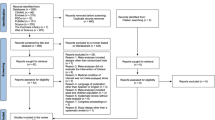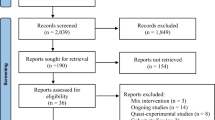Abstract
Purpose
This study was designed to critically evaluate the effect of music interventions on cancer-related fatigue (CRF) in cancer patients.
Methods
Seven databases (Cochrane Library, PubMed, Embace, CBM, Wanfang, VIP, and CNKI) were systematically reviewed from inception to June 2020 for randomized controlled trials (RCTs). Two reviewers critically and independently assessed the risk of bias using Cochrane Collaboration criteria and extracted correlated data using the designed form. All analyses were performed with Review Manager 5.3.
Results
A total of 8 qualified studies that included 467 patients (music interventions: 235, control: 232) were included. Cancer patients who completed adjuvant therapy in the music intervention group, especially those with malignant hematological diseases, reported reduced CRF levels compared with patients undergoing routine care. Regardless of the frequencies, music interventions can relieve fatigue in cancer patients. Providing prerecorded music and participating in live music both can mitigate CRF.
Conclusions
Music interventions can be considered as an alternative therapy for relieving fatigue in cancer patients who are undergoing active treatment or have completed treatment.



Similar content being viewed by others
Data availability
The authors have full control of all primary data and agree to allow the journal to review the data if requested.
References
Ebede CC, Jang Y, Escalante CP (2017) Cancer-related fatigue in cancer survivorship. Med Clin North Am 101:1085–1097. https://doi.org/10.1016/j.mcna.2017.06.007
Mohandas H, Jaganathan S, Mani M, Ayyar M, Thevi GR (2017) Cancer-related fatigue treatment: an overview. J Can Res Ther. https://doi.org/10.4103/jcrt.JCRT_50_17
National Comprehensive Cancer Network(NCCN). NCCN Clinical Practice Guidelines in Oncology- Cancer-Related Fatigue (version 1.2020) [EB/OL]. Available at http://www.nccn.org/professionals/physician_gls/pdf/fatigue.pdf
Vardy JL, Dhillon HM, Pond GR, Renton C, Dodd A, Zhang H, Clarke SJ, Tannock IF (2016) Fatigue in people with localized colorectal cancer who do and do not receive chemotherapy: a longitudinal prospective study. Ann Oncol 27:1761–1767. https://doi.org/10.1093/annonc/mdw252
Andrykowski MA, Donovan KA, Laronga C, Jacobsen PB (2010) Prevalence, predictors, and characteristics of off-treatment fatigue in breast cancer survivors. Cancer 116:5740–5748. https://doi.org/10.1002/cncr.25294
Pachman DR, Price KA, Carey EC (2014) Nonpharmacologic approach to fatigue in patients with cancer. 20:313–318. https://doi.org/10.1097/PPO.0000000000000064
Menon V, Levitin DJ (2005) The rewards of music listening: response and physiological connectivity of the mesolimbic system. NeuroImage 28:175–184. https://doi.org/10.1016/j.neuroimage.2005.05.053
Stegemoller EL (2014) Exploring a neuroplasticity model of music therapy. J Music Ther 51:211–227. https://doi.org/10.1093/jmt/thu023
Bradt J, Dileo C, Magill L, Teague A (2016) Music interventions for improving psychological and physical outcomes in cancer patients. Cochrane Database Syst Rev: CD 006911. https://www.ncbi.nlm.nih.gov/pubmed/27524661
Bradt J, Dileo C, Magill L, Teague A (2016, 2016) Music interventions for improving psychological and physical outcomes in cancer patients. https://doi.org/10.1002/14651858.CD006911.pub3
Edwards J (2008) The use of music in healthcare contexts: a select review of writings from the 1890s to the 1940s voices: a world forum for music therapy. University of Bergen
Köhler F, Martin Z, Hertrampf R, Gäbel C, Kessler J, Ditzen B, Warth M (2020) Music therapy in the psychosocial treatment of adult cancer patients: a systematic review and meta-analysis. Front Psychol 11. https://doi.org/10.3389/fpsyg.2020.00651
Bufalini A (2009) Role of interactive music in oncological pediatric patients undergoing painful procedures. Minerva Pediatr 61:379–389
Nguyen TN, Nilsson S, Hellström AL, Bengtson A (2010) Music therapy to reduce pain and anxiety in children with cancer undergoing lumbar puncture: a randomized clinical trial. J Pediatr Oncol Nurs 27:146–155. https://doi.org/10.1177/1043454209355983
Clark M, Isaacks-Downton G, Wells N, Redlin-Frazier S, Eck C, Hepworth JT, Chakravarthy B (2006) Use of preferred music to reduce emotional distress and symptom activity during radiation therapy. 43:247–265. https://doi.org/10.1093/jmt/43.3.247
Burns DS (2001) The effect of the bonny method of guided imagery and music on the mood and life quality of cancer patients. J Music Ther 38:51–65. https://doi.org/10.1093/jmt/38.1.51
Moher D, Liberati A, Tetzlaff J, Altman DG (2010) Preferred reporting items for systematic reviews and meta-analyses: the PRISMA statement, International journal of surgery (London, England). 8:336–341. https://doi.org/10.1016/j.ijsu.2010.02.007
Moher D, Liberati A, Tetzlaff J, Altman DG (2009) Preferred reporting items for systematic reviews and meta-analyses: the PRISMA statement. PLoS Med 6:e1000097. https://doi.org/10.1371/journal.pmed.1000097
Chen SC, Yeh ML, Chang HJ, Lin MF (2019) Music, heart rate variability, and symptom clusters: a comparative study. 28:351–360. https://doi.org/10.1007/s00520-019-04817-x
Chirico A, Maiorano P, Indovina P, Milanese C, Giordano GG, Alivernini F, Iodice G, Gallo L, De Pietro G, Lucidi F, Botti G, De Laurentiis M, Giordano A (2019) Virtual reality and music therapy as distraction interventions to alleviate anxiety and improve mood states in breast cancer patients during chemotherapy. J Cell Physiol 235:5353–5362. https://doi.org/10.1002/jcp.29422
LuLiu (2019) Clinical study of music therapy on improving the symptoms of malignant tumor patients. Hebei Medical University, Shijiazhuang. http://www.wanfangdata.com.cn/details/detail.do?_type=degree&id=D01840126
Reimnitz L, Silverman MJ (2018) A randomized pilot study of music therapy in the form of patient-preferred live music on fatigue, energy and pain in hospitalized adult oncology patients on a blood and marrow transplant unit. https://doi.org/10.1080/17533015.2018.1534251
Wang XY (2017) The improvement of progressive muscle relaxation training combined with traditional Chinese medical music on anxiety depression and quality of life of cancer patients. J Mod Oncol 25:3509–3512
Rosenow SC, Silverman MJ (2014) Effects of single session music therapy on hospitalized patients recovering from a bone marrow transplant: two studies. Arts Psychother 41:65–70. https://doi.org/10.1016/j.aip.2013.11.003
Ferrer AJ (2007) The effect of live music on decreasing anxiety in patients undergoing chemotherapy treatment. https://doi.org/10.1093/jmt/44.3.242
Cassileth BR, Vickers AJ, Magill LA (2003) Music therapy for mood disturbance during hospitalization for autologous stem cell transplantation. Cancer 98:2723–2729. https://doi.org/10.1002/cncr.11842
Tsai HF, Chen YR, Chung MH, Liao YM, Chi MJ, Chang CC, Chou KR (2014) Effectiveness of music intervention in ameliorating cancer patients’ anxiety, depression, pain, and fatigue. Cancer Nurs 37:E35–E50. https://doi.org/10.1097/NCC.0000000000000116
O'Regan P, McCarthy G, O’Reilly S, Power D, Bird BH, Murphy CG, Hegarty J (2019) Cancer-related fatigue and self-care agency: a multicentre survey of patients receiving chemotherapy. J Clin Nurs 28:4424–4433. https://doi.org/10.1111/jocn.15026
Berger AM (1998) Patterns of fatigue and activity and rest during adjuvant breast cancer chemotherapy. Oncol Nurs Forum 25:51–62
Junghaenel DU, Cohen J, Schneider S, Neerukonda AR, Broderick JE (2015) Identification of distinct fatigue trajectories in patients with breast cancer undergoing adjuvant chemotherapy. Support Care Cancer 23:2579–2587. https://doi.org/10.1007/s00520-015-2616-x
Clark M, Isaacks-Downton G, Wells N, Redlin-Frazier S, Eck C, Hepworth JT, Chakravarthy B (2006) Use of preferred music to reduce emotional distress and symptom activity during radiation therapy. 43:247–265. https://doi.org/10.1093/jmt/43.3
Zeng JF (2017) Yoga joint music relaxation training intervention for breast cancer chemotherapy patients with cancer-related fatigue effect. J Clin Nurs Pract 2:1–2. https://doi.org/10.3969/j.issn.2096-2479.2017.19.001
Mustian KM, Morrow GR, Carroll JK, Figueroa-Moseley CD, Jean-Pierre P, Williams GC (2007) Integrative nonpharmacologic behavioral interventions for the management of cancer-related fatigue. Oncologist 12(Suppl 1):52–67. https://doi.org/10.1634/theoncologist.12-S1-52
Tian L, Lu HJ, Lin L, Hu Y (2016) Effects of aerobic exercise on cancer-related fatigue: a meta-analysis of randomized controlled trials. Support Care Cancer 24:969–983. https://doi.org/10.1007/s00520-015-2953-9
Walworth DD (2003) The effect of preferred music genre selection versus preferred song selection on experimentally induced anxiety levels. J Music Ther 40:2–14. https://doi.org/10.1093/jmt/40.1.2
Mitchell LA, MacDonald RAR, Brodie EE (2006) A comparison of the effects of preferred music,arithmetic and humour on cold pressor pain. 10:343–343. https://doi.org/10.1016/j.ejpain.2005.03.005
Liao J, Yang YF, Cohen L, Zhao YC, Xu Y (2013) Effects of Chinese medicine five-element music on the quality of life for advanced cancer patients: a randomized controlled trial. Chin J Integr Med 19:736–740. https://doi.org/10.1007/s11655-013-1593-5
Yang XX, Yue LQ, Xie HQ (2008) Effect on music therapy on quality of life for cancer patients. Mod Nurs 14:169–170. https://doi.org/10.3760/cma.j.issn.1674-2907.2008.02.012
Huang YN, Yang X, Yang Y (2012) Effect of traditional Chinese medicine five elements music on cancer related fatigue of chemotherapy patient. Chin J Mod Nur 12:1412–1414. https://doi.org/10.3760/cma.j.issn.1674-2907.2012.12.017
Luo ZQ, Jiao J, Nian WY, Jiao J, Quan MM (2015) Effect of moxibustion combined with traditional Chinese medicine five elements music on cancer-related fatigue of patients. Tianjin J Nurs 23:155–157. https://doi.org/10.3969/j.issn.1006-9143.2015.02.040
Xiang DY, Wang M, Wang H, Liu J, Liu J, Cao ZR (2017) Intervention effect of yoga combined with music relaxation training on cancer related fatigue in breast cancer patients undergoing chemotherapy. Chin J Mod Nurs 23:184–187. https://doi.org/10.3760/cma.j.issn.1674-2907.2017.02.009
Wang QS, Wei QF, Zhong QL, An D, Xu D, Zhao YX, Xiong Y, Li JP (2019) Application of multiple-modality exercise combined with music imaging in naso- pharyngeal carcinoma patients with radiotherapy andchemotherapy. Chin J Nurs 54:527–531. https://doi.org/10.3761/j.issn.0254-1769.2019.04.010
Funding
This study was supported by the Humanity and Social Science Youth Foundation of Ministry of Education of China (Project No. 18YJCZH164).
Author information
Authors and Affiliations
Contributions
Qi YS, Lin Lu, Dong B, and Xu EW performed the metaanalysis. Qi YS, Lin L, and Tian L wrote the first draft of the manuscript. Bao ZK and Qi J supervised the work. Tian L and Chen XK revised the final manuscript.
Corresponding authors
Ethics declarations
Conflict of interest
The authors declare that they have no conflict of interest.
Ethical approval
N/A
Consent to participate
N/A.
Consent for publication
All authors have read and approved the final manuscript.
Code availability
N/A.
Additional information
Publisher’s note
Springer Nature remains neutral with regard to jurisdictional claims in published maps and institutional affiliations.
Supplementary Information
ESM 1
(DOC 64 kb)
Appendix
Appendix
Rights and permissions
About this article
Cite this article
Qi, Y., Lin, L., Dong, B. et al. Music interventions can alleviate cancer-related fatigue: a metaanalysis. Support Care Cancer 29, 3461–3470 (2021). https://doi.org/10.1007/s00520-021-05986-4
Received:
Accepted:
Published:
Issue Date:
DOI: https://doi.org/10.1007/s00520-021-05986-4




